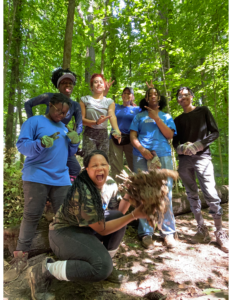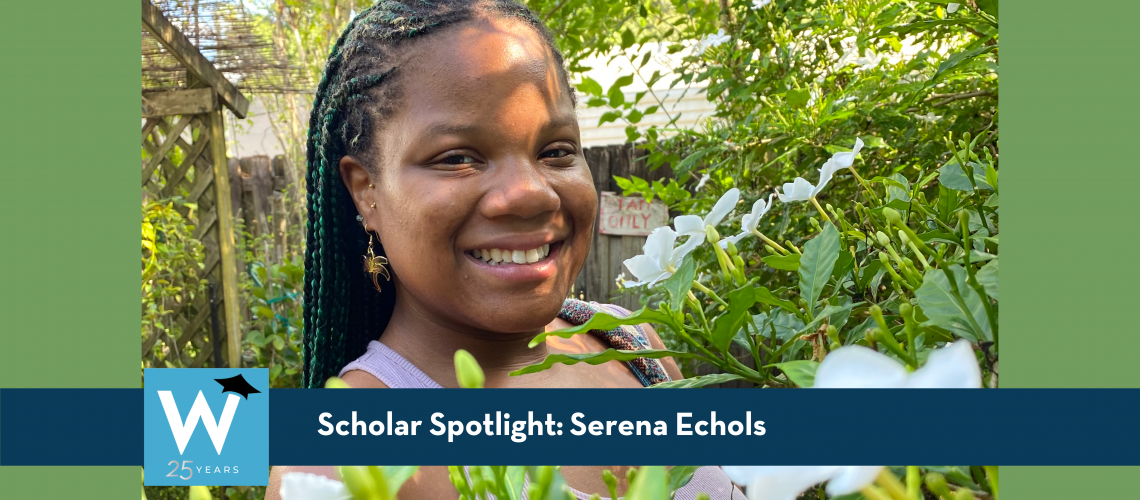 An Auburn Gresham and Chicago Lawn native, Serena Echols became a Wentcher Scholar when she graduated from Morgan Park High School in 2019. Currently she is a senior at Spelman college studying Environmental Science.
An Auburn Gresham and Chicago Lawn native, Serena Echols became a Wentcher Scholar when she graduated from Morgan Park High School in 2019. Currently she is a senior at Spelman college studying Environmental Science.
Serena’s interest in the environment began at a young age through gardening. Growing up she would use milk cartons and cat litter boxes to make small gardens with her dad. However, when she first came to college she was a biology major and was pre-med because she wanted to be a doctor. However, Serena realized that she was no longer interested in biology, and that her heart belonged with nature.
At Spelman Serena is a member of the Corella & Bertram Bonner Scholar Foundation in which she often has to participate in community service. Her freshman year in college she served as a teaching assistant for first grades. Sophomore year she worked at the West Atlanta Watershed Alliance producing virtual content like her contribution “A day Without Water”. She also collected community data through conducting elder surveys, and worked at their summer camp O Academy in which she was able to engage local Atlanta youth and facilitate activities and seek to impact the visitor’s attitudes and behaviors about nature.
Currently, Serena is focused on her research project on invasive plant species of which she was introduced to sophomore year. She happened to be walking through the old growth forest located in the heart of the west side of Atlanta. This forest is extremely valuable because it has never been burned or cut down. Furthermore, it has never even had civilization there. As she was walking with her mentor basking in the rich biodiversity of the forest when she was informed about invasive species to plants like English Ivy, Illy Agnes, and Kudzu. These invasive species stunt the growth of the native species that are there, and so a lot of her project is centered around working to remove invasive species and restore the forest.
For the past few summers, Serena has led groups from the Atlanta Botanical Garden, Atlanta Student Conservation Association, and Delta Airlines to work to remove the invasive species and educate them on the matter. For her thesis she began to do vegetation studies to see what and how much of the invasive species’ regrow after removal. From her research she has learned that all invasives do grow back but the percentages are lower than before. In order to take this data she would count the number of native and invasive species after cutting them in a transect and record those numbers to figure out the ratio of invasive species to native species. Prior to her efforts to remove the invasive species, the forest showed a rate of 100% invasive species. One of the most valuable finds from her work is from the 2020 invasive species removal that she conducted. Orange Milk Jewelweed, which is a lavish green native species in Georgia, grew back and restored to its rightful home.
We asked Serena her favorite things about the work that she does and she said other than being able to deepen her love for nature through research and activities like hiking, she thoroughly enjoys meeting new people. Through teaching other people about environmental issues she is able to help get them involved in working to restore nature. Serena also said that she enjoys that this work has allowed her to have a great understanding of the symbiotic relationship between humans and the environment.
Serena’s line of work has also afforded her the ability to be able to travel. Among the places she has been to includes the Dominican Republic, Mexico, Senegal, and she even participated in a research program in Florida that she is very fond of. Last summer Serena participated in the Research Experience for Undergraduates (REU) Program funded by the National Science Foundation. This REU Program was hosted at the University of South Florida in Tampa and focused on the area of Urban Water Sustainability. In this program, she worked closely with a faculty mentor Dr. Christian Wells, a graduate student, and another undergraduate student. Their research focused on Environmental Justice from water where they investigated the coping mechanisms that the African American community of Tallevast, Florida used after their water and soil were contaminated. At the end of the summer, they presented their research at the REU Symposium and won first place, along with the funding to present at two conferences in 2023: Society for Applied Anthropology Conference, Cincinnati, Ohio, and Research Experience for Undergraduates National Conference in Eau Claire, Wisconsin. This semester she presented environmental justice research at the Naval Academy Science and Engineering Conference in Annapolis, Maryland, the Florida Brownfields Association Environmental Justice Workshop in Port St. Joe, Florida, and Metro Atlanta’s Urban Waters Symposium. After her presentation at the Florida Brownfields Association Environmental Justice Workshop, she was nominated and accepted to the position of Student Representative on the Board of Directors.
In the future, Serena hopes to become an environmental intermediary to bridge the gap between community and policy.. Additionally, she’s writing a children’s book to teach young students about invasive species titled “Old Growth Msitu.” She also plans to pursue activism around Environmental Justice. Currently she is working on a documentary in which she is doing oral history interviews with community members that have volunteered in the forest in the Bush mountain community, a group of native Black people native to that area. The subject of the documentary is their fight against gentrification. With this documentary and her activism, Serena’s goal is to preserve, capture, and honor native populations of people and plants. Serena will also be attending graduate school in Fall of 2023 to pursue an M.A. in Public Health and Environmental Applied Anthropology. Lastly, she has been exploring corporate options as well with environmental consulting and a possible position with the Environmental Protection Agency.
Serena has some great advice for those looking to get into environmental studies and research. As a huge fan of the phrase “Team work makes the dream work,” Serena advises not to do things by yourself. When she first began her research project she didn’t have teams of people helping her and now having teams makes it easier to get the work done. She also suggests that you should not be afraid to delegate tasks to others and educate them to help them better assist you. Most importantly, she says that because environmental projects can be long and ongoing there becomes quite a build up of tasks, and so it is really imperative that you communicate your needs around what you need help with.
We at the Wentcher Foundation are extremely proud of Serena and cannot wait to see what she accomplishes post graduation!

